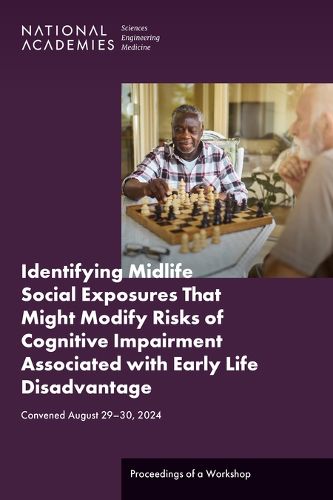Readings Newsletter
Become a Readings Member to make your shopping experience even easier.
Sign in or sign up for free!
You’re not far away from qualifying for FREE standard shipping within Australia
You’ve qualified for FREE standard shipping within Australia
The cart is loading…






Early life disadvantages have been associated with a higher risk of dementia, but the risk may be modified by early life and midlife exposures. While attention is often given to individuals' behavior and choices, structural and institutional forces may be more effective in addressing risk factors.
The Committee on Population held a two-day public workshop on August 29-30, 2024 that examined what measures, data infrastructure needs, and analytic measures can advance understanding of how midlife social exposures can address early life risk factors. Participants discussed the state of knowledge and identified conceptual approaches to guide research on better understanding midlife exposures that may be modifiable in reducing the risk of later-life dementia. This publication summarizes the presentations and discussion from the workshop.
Table of Contents
Front Matter 1 Introduction 2 Laying the Foundation 3 Life Course Models of Cognition and Risk of Dementia 4 Educational and Workplace Contexts 5 Social and Health Policies 6 Social Support and Integration (Neighborhoods) 7 Environmental and Cardiovascular Exposures 8 Key Takeaways and Future Directions References Appendix A: Public Meeting Agendas Appendix B: Biographies of Planning Committee Members Appendix C: Biographies of Workshop Presenters
$9.00 standard shipping within Australia
FREE standard shipping within Australia for orders over $100.00
Express & International shipping calculated at checkout
Early life disadvantages have been associated with a higher risk of dementia, but the risk may be modified by early life and midlife exposures. While attention is often given to individuals' behavior and choices, structural and institutional forces may be more effective in addressing risk factors.
The Committee on Population held a two-day public workshop on August 29-30, 2024 that examined what measures, data infrastructure needs, and analytic measures can advance understanding of how midlife social exposures can address early life risk factors. Participants discussed the state of knowledge and identified conceptual approaches to guide research on better understanding midlife exposures that may be modifiable in reducing the risk of later-life dementia. This publication summarizes the presentations and discussion from the workshop.
Table of Contents
Front Matter 1 Introduction 2 Laying the Foundation 3 Life Course Models of Cognition and Risk of Dementia 4 Educational and Workplace Contexts 5 Social and Health Policies 6 Social Support and Integration (Neighborhoods) 7 Environmental and Cardiovascular Exposures 8 Key Takeaways and Future Directions References Appendix A: Public Meeting Agendas Appendix B: Biographies of Planning Committee Members Appendix C: Biographies of Workshop Presenters